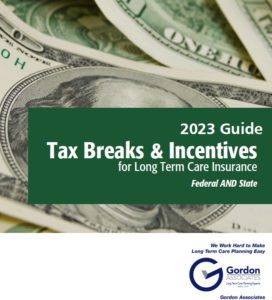Dementia is a progressive, chronic disease that primarily impacts the brain. Most people have heard of dementia (or Alzheimer’s, a specific form of dementia). Unfortunately, dementia is not always the most pleasant topic of conversation–so people tend to avoid talking about it. That can be a problem, especially when it comes to Long Term Care Insurance (LTCI) for dementia patients.
Individuals who have been diagnosed with dementia or Alzheimer’s disease often require significant long term care. The costs associated with that care can escalate rapidly, but LTCI can help.
Talking about dementia isn’t fun. But the better prepared you are for this particular possibility, the better you’ll be able to protect yourself, your family, and your financial plans.
Dementia Usually Requires “Memory Care”
Those who have dementia will likely require a significant amount of help to achieve daily tasks necessary for living. For example, those with dementia will likely need help with tasks such as eating, sleeping, taking medication, and so on. For that reason, many people with dementia will either end up in an assisted living facility or with live-in help at home or as long as possible.
Those with dementia will also usually receive specialized care known as “memory care.” Memory care can include the following:
- Memory-stimulating activities, such as listening to music.
- Around-the-clock care and supervision.
- Structured social activities designed to stimulate cognitive health.
- Medication management, including prescription and non-prescription medications.
- Help with day-to-day activities, including hygiene activities (such as bathing, brushing teeth, and so on).
Memory care can be an extensive (and expensive) treatment option, but it seems to be the one that offers the most comfort and compassion for those with dementia. It’s not something that you can really opt out of. That’s why Long Term Care Insurance can be essential to helping defray some of those associated costs.
Long Term Care Insurance for Dementia Can Provide a Lifeline
Dementia presents families with a long term financial (and emotional) challenge. That’s because the disease takes a long time to run its course. Many people will live between 8-10 years after their diagnosis–if not longer. This is good news, as it gives you more time with loved ones–but it does represent years of additional care needs (and additional costs).
Long Term Care Insurance provides a resource you can tap into, helping to defray those costs. In many cases, LTCI can also help protect you from inflation associated with rising long term care costs.
What to Do If You Already Have Long Term Care Insurance
So, let’s say you already have LTCI. That’s a good thing! What do you need to know about Long Term Care Insurance for dementia patients? Well, there are a few things you should keep in mind:
- Most types of LTCI will cover the needs associated with a dementia diagnosis. Still, it doesn’t hurt to revisit and review your plan and your options.
- Don’t wait to file a claim. If you suspect the onset of dementia or Alzheimer’s disease, file that claim as soon as possible. This can help you start working through your elimination period (the LTCI equivalent of a deductible). Keep in mind, most carriers require care to be in place before the claim is initiated.
- Talk to your physician or your family’s care team. It’s important to be clear-headed about the type of care that may be required after your diagnosis. During these conversations, you can get an idea of what to expect.
What to Do if You Don’t Have Long Term Care Insurance Yet
If you don’t already have Long Term Care Insurance, the thought of dementia or Alzheimer’s in the future may give you some motivation to start the process of getting your own LTCI policy. This will provide you with an extra layer of financial security should you be diagnosed in the future.
As you consider your options, there are a couple of things you should know when selecting your plan, including the following:
- Stand-alone (or traditional) plans will want to know a bit about your family history. That’s especially true when it comes to family history of Alzheimer’s or dementia. They’ll want to know whether your parents or siblings have been diagnosed with Dementia or Alzheimer’s, for example. In some cases, when they find 1 parent or 1 sibling has been diagnosed with dementia or Alzheimer’s, your application may be rated (higher risk) or dismissed. But that’s not true for every carrier and every applicant (which means it may still be worth considering a traditional stand-alone plan).
- Hybrid plans tend to be less particular when it comes to your family history. Again, this is especially true as it relates to Alzheimer’s and dementia. At least, that’s how hybrid plans have been structured historically–there’s always the potential that this may change in the future, but for now that doesn’t seem to be the case.
No matter which type of LTCI plan you choose, the sooner you apply, the better.
There are Resources Available to You
Should dementia become a reality for you or a family member, we recommend you build a team to help you. The medical, financial, and daily care needs will grow and get more and more complex. There are nuances of the systems that experts who know the system can help you with. Ask around your area for good dementia care resources and start there. We know a number of resources in this area and are happy to talk with anyone and refer.
Tackling Dementia is a Big Job
It’s never easy when a loved one is diagnosed with dementia. But discussing the possibility beforehand (or, at least, as soon as possible) can help prepare you and your family. Part of that preparation should include Long Term Care Insurance, as a robust policy can provide you with a critical financial asset to help take care of your health.
But finding the right plan can be a challenge. Talk to Gordon Associates today to help select a Long Term Care Insurance policy that’s right for you and for your needs.


 To help determine if long-term care (LTC) insurance is right for you, we are offering a FREE informational guide. This is a comprehensive booklet that will answer many of your questions about tax breaks and incentives for LTCI for federal and state taxes.
To help determine if long-term care (LTC) insurance is right for you, we are offering a FREE informational guide. This is a comprehensive booklet that will answer many of your questions about tax breaks and incentives for LTCI for federal and state taxes. To help determine if long-term care (LTC) insurance is right for you, we are offering a FREE informational guide. This is a comprehensive booklet that will answer many of your questions about LTC and assist you with your health care planning.
To help determine if long-term care (LTC) insurance is right for you, we are offering a FREE informational guide. This is a comprehensive booklet that will answer many of your questions about LTC and assist you with your health care planning.